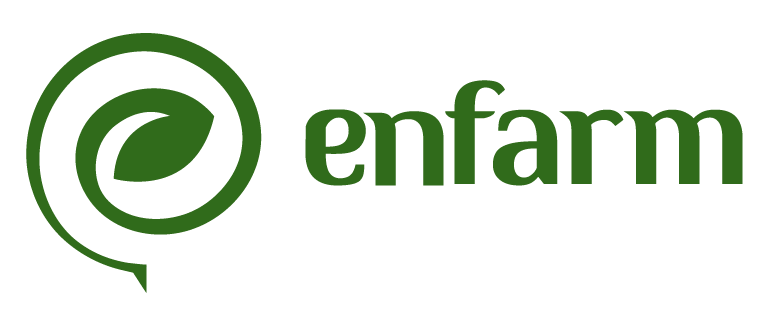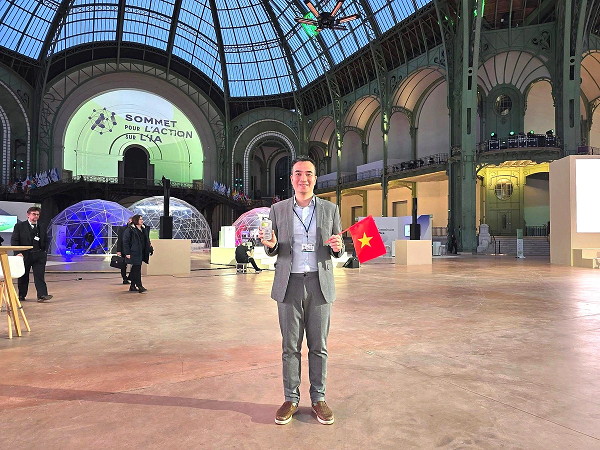Enfarm, a Vietnamese agricultural artificial intelligence (AI) startup, was one of four Asian representatives among the 50 projects showcased at the AI Action Summit in Paris, France, on February 10 and 11.
Tuoi Tre had a conversation with Enfarm’s cofounder and CEO, Mr. Nguyen Do Dung, shortly after his return from this premier global AI event.
Concerns about farmers’ risks
Q: How did you feel when Enfarm was introduced at the Paris AI Summit?
A: I was very proud that Enfarm, a young technology startup in Vietnam, was chosen for the world’s largest AI event. The summit brought together leading scientists and experts, the biggest tech corporations, and heads of state, including the President of France and the Prime Minister of India.
Enfarm was selected because it brings AI to farmers, the group that is often the slowest to access new technology. The company applies the Internet of Things (IoT) and AI to create soil measurement technology with laboratory-level accuracy. This helps farmers better understand soil conditions and crop needs.
The product helps farmers make better crop decisions by saving fertilizer, increasing yields, and reducing greenhouse gas emissions. At the same time, it addresses three challenges: raising incomes, reducing chemical inputs in agriculture, and ensuring food security.
Through this platform, Enfarm hopes to enter new markets beyond Vietnam and Southeast Asia, aiming to become a global leader in agricultural technology and AI.
Q: What helped Enfarm succeed at this event?
A: Fifty projects, including four from Asia, were selected from 800 submissions. It was a highly competitive process, judged by an international panel of dozens of scientists from different fields.
Three key factors persuaded the judges: effective use of AI, new scientific contributions for the environment and sustainability, and strong social impact. Based on calculations in Central Highlands coffee farms, we help farmers increase yields by 30 percent with 30 percent less fertilizer, boosting incomes by about one and a half times.
Enfarm’s technology is not only strong technically but also delivers practical value for people and the environment. This was also a central theme of the summit, which emphasized ethics in AI development tied to solving global issues, especially the environment, sustainability, and poverty reduction.
Technology has no borders. When people look at a product, they do not care where you come from, your skin color, or your education. The surprise does not come from whether the product is from Vietnam, the United States, France, or China. It comes from the product’s breakthroughs and novelty.
— Dung Nguyen Do
Helping soil and crops “speak”
Q: Where did the inspiration for Enfarm come from? Were there obstacles in bringing IoT and AI to farmers?
A: While working in urban planning, I saw that Vietnamese agriculture faces many risks related to markets and climate, as well as continuous global disruptions caused by war and trade conflicts. Smallholder farmers operate at small scale with low incomes and can lose everything to pests or drought.
I also had the opportunity to work with Dr. Ho Long Phi, an outstanding Vietnamese scientist who helped build Enfarm’s scientific foundation. Our technology has been well received by farmers. Eighty percent of surveyed farmers believe inorganic fertilizer has a major impact on soil and crops, but they lack measurement tools and apply fertilizer based on habit.
The biggest challenge is trust, after experiences with fake fertilizers and long waits for results that can take up to six months. Unlike other products, farmers must wait an entire season to see the technology’s effect. This is a new scientific field in both Vietnam and the world. One farmer said, “Thanks to Enfarm, now the soil and the crops can speak.”
When working with agricultural scientists and large global corporations, they were surprised by our approach. To convince them, we went through five to seven rounds of interviews.
Q: In your view, what should Vietnam do to get ahead of the AI wave?
A: First, Vietnamese people should use Vietnamese products, because domestic companies are capable and this helps ensure sovereignty over data and AI. This is especially important as technology becomes central to socio-economic development.
Second, startups hope for government support in resources, networks, funding, and tax policy, given the high risks in this sector. Developed countries are moving quickly to support businesses, with governments willing to take risks and certify new products.
Third, AI literacy should be made universal for everyone, from writing documents to making investment decisions. The world will soon be divided between those who know how to use AI and those who do not. This is Vietnam’s opportunity, with a young population, strong learning ability, openness to new ideas, and flexible thinking.


